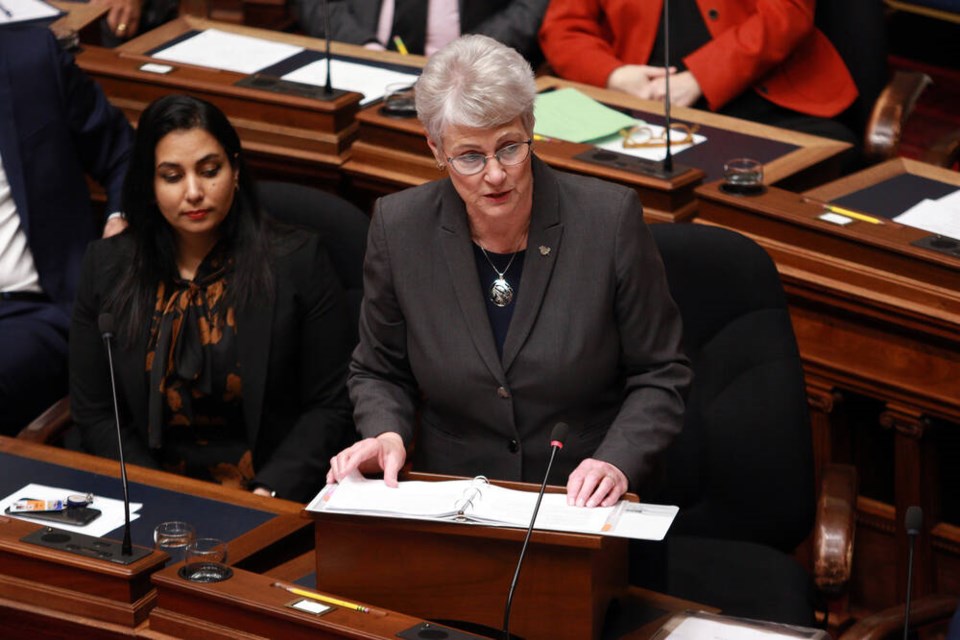With a focus on health care, housing and addressing inflationary pressure, B.C. Finance Minster Katrine Conroy presented a budget Tuesday big on spending and seemingly designed to cushion the blow of difficult economic times ahead.
The budget includes $6.4 billion in health-care spending over the next three years, $4.2 billion in housing initiatives and $4.5 billion in measures to deal with the rising cost of living.
“B.C. is a great place to live, but people are facing real challenges — not only from global inflation and the pandemic, but from ongoing and systemic challenges,” said Conroy. “This year’s budget helps protect people who can’t afford today’s high prices and takes action on the issues people care about, like finding affordable housing and accessing health care.”
The province expects to run a deficit of $4.2 billion in 2023-24. Because some of the spending measures kick in immediately, the projected surplus of $5.7 billion expected in 2022-23 will now be closer to $3.6 billion.
Conroy is anticipating deficits of $3.8 billion in 2024-25 and $3 billion in $2025-26.
Over the course of the fiscal plan, the province’s total debt is expected to go from $93.5 billion at the end of the 2022-23 fiscal year to $134 billion in 2025-26.
Conroy said the balance of this year’s surplus would be spent before the end of the fiscal year on March 31.
“As I’ve been pretty clear about, we don’t think we’ll ever see a surplus like that again,” she said. “I wouldn’t say we don’t care about deficits, but what I will say is that I think we’ve proven during the pandemic that we can incur deficits by supporting people, but we still have a strong economy. So we’ve proven that it’s working and right now … it’s just not the right time to start making cuts.”
The budget for housing measures includes money for the Indigenous Housing Fund and the Community Housing Fund, $394 million to help buy land for thousands of new homes near future transit developments, $66 million to help those with urgent housing needs and $575 million for student housing, including projects underway at the University of Victoria, Vancouver Island University and North Island College.
The long-promised renters’ rebate showed up in this budget as a new renters’ tax credit that will kick in next year and could save low-income renters as much as $400 a year.
There is money to expand B.C. Housing’s rental stock, and a $15 million to speed up dispute-resolution at the Residential Tenancy Branch.
Housing spending on the Island includes continued funding for Cool Aid Society to complete the $72-million redevelopment of the Crosstown site at 3020 Douglas St., which will offer 54 supportive-housing units along with commercial space and a child-care centre.
Another $640 million has been pledged over three years for the supportive-housing fund to help people experiencing or at risk of homelessness, $169 million to create additional new complex-care housing units and $97 million to support complex-care services.
There is also $228 million over three years to establish regional teams to support rapid response for communities dealing with encampments, and $44 million to expand access to temporary modular supportive housing and provide more on-site support for people living in encampments.
“We’ve been hoping to see many of the announcements we saw in today’s budget, so we are encouraged overall,” said Jill Atkey, chief executive of the B.C. Not for Profit Housing Association.
Atkey said the $4.2 billion for housing will address the need for new supply, and help organizations deal with inflationary costs. “This budget is recognition that our market is not working as it should, and recognition that the goal posts keep moving and it keeps becoming more unaffordable, which means more investment will be required.”
The budget contains $462 million to put into effect many of the initiatives announced last fall in the Safer Communities Action Plan.
That includes $230 million to hire another 256 RCMP officers in rural, remote and Indigenous communities and $87 million for two enforcement programs — the Repeat Violent Offending Intervention Initiative and the Special Investigation and Targeted Enforcement program.
Bridgitte Anderson, chief executive of the Vancouver Board of Trade, gave the budget a C-minus for economic vision, fiscal prudence and tax competitiveness, saying it lacks an economic strategy that would attract investment, and increase B.C.’s competitive advantage and innovation capacity at a time when businesses face increased costs.
She said the spending on social programs and skills training is welcome, but needs to come in addition to improving the province’s competitiveness.
Businesses could have used an increase to the threshold for the employer health tax and provincial sales tax rebates in some areas, she said.
The province’s spending comes with a backdrop of economic doom and gloom. The government anticipates the economy will grow by 0.4 per cent in 2023, after an estimated 2.8 per cent growth in 2022.
John Wilson, owner of Victoria-based Wilson’s Transportation, said he would have liked to have seen more investment in tourism and tourism infrastructure.
Wilson, who suspended his Victoria-Tofino coach service and Vancouver Island Connector service between Nanaimo and Campbell River until May due to heavy financial losses, would also have liked to see sustained funding to subsidize inter-city bus service in remote communities on the Island and the rest of the province. He said he hopes funding will be announced this spring.
>>> To comment on this article, write a letter to the editor: [email protected]




